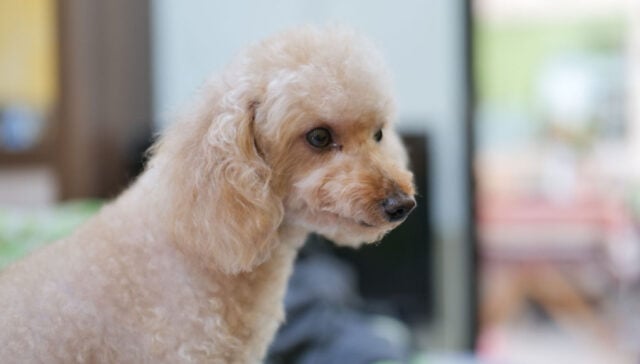
Poogle—the charming name pretty well sums it up! What could be cuter than a beagle-poodle mix?
Your heartstrings will be tugged by this breed's affectionate and inquisitive personality.
Moreover, they're ready to cuddle up for a relaxing forenoon on the couch and entertain you with their antics!
But of course, there are many additional factors to consider before bringing a furry child into your life.
So, we’ve covered everything you’ll need to know right here.
Is a beagle-poodle mix the right kind of dog for you?
Read more, and you’ll find out!
Poogle History
The Poogle is one of the earliest hybrids thought to have been created, having its origins in the 1980s in America.
It is a mix between the Beagle and the small or toy Poodle. The outcome is a cute mixed-breed dog that has gained much popularity in the US.
Sometimes the breed mix is referred to as a Beaglepoo, Beagle Doodle, or Beapoo.
While the Poogle has only been around for a few years, we have much more to share about each of its parents.
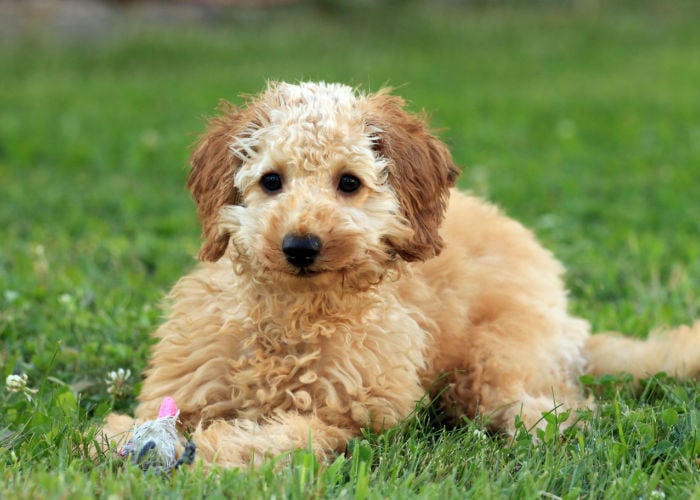
The Poodle
Poodles were first used as water-retrieving dogs in Germany. They are part of the American Kennel Club (AKC) Non-Sporting Group.
The name derives from the German word “pudel,” which means “to splash in the water.”
Poodles are a ‘Utility' breed of dog that has historically been used for sniffing out truffles, hunting, and retrieving prey (especially ducks) from the water.
Due to their loving and clever personality and availability in three different sizes (Toy, Miniature, and Standard), the Poodle is the basis for a significant variety of designer dogs.
It helped numerous breeds, such as the Bichon Frise and Miniature Schnauzer, avoid extinction when their populations were small.
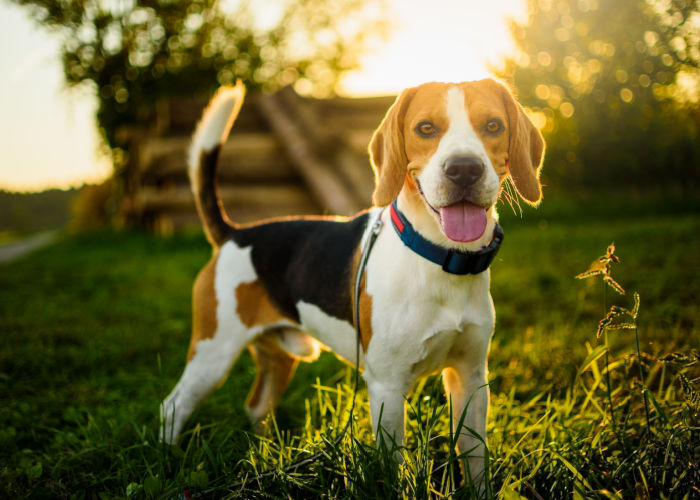
The Beagle
In 1885, England granted official breed status to the Beagle. They came from the breeding of smaller hunting dogs that were used to scent-track rabbits.
The Beagle is a petite, short-haired dog with large ears that rest against the head. Tan, black, and white are the main hues of the coat.
Compared to today's Beagle, those from earlier times were noticeably shorter. It was not until the mid-1800s that the breed was exported to the United States.
They were right away popular with American rabbit hunters, and the AKC recognized the breed in 1885.
Poogle Characteristics
Given the differences in the fur between beagles and poodles, the beagle-poodle mix's coat might vary.
Generally speaking, Poogles will typically have a wavy coat that falls in between the wavy, thick fur of the Poodle and the short, straight coat of the Beagle.
Different possible coat colors exist, including black, brown, grey, white, and red.
Many dogs will have two or three colors, and white patches are a common trait.
A beagle-poodle mix is distinguished by its pendulous ears, which frequently reach the chin. Their distinctive dark brown eyes give them a “contemplative” expression.
They may have a rather lengthy muzzle that ends in a black or brown nose. They should have a lean, muscular body that is supported by strong limbs.
In addition, the tail of the Poogle has what is referred to as a “sickle-shaped” curl that extends over its back and toward its head.
At adulthood, the typical Poogle stands between 10-15 inches tall and weighs between 11 and 25 lbs.
The size may change depending on how much of each parent breed it has inherited.
For instance, a Poogle created by crossing a Beagle with a standard Poodle is likely to be bigger than one created by crossing a Beagle with a small or toy Poodle.
Poogle Temperament & Behavior
The Poogle is a sociable dog who enjoys being around people. They tend not to be unduly apprehensive of strangers and are at ease in anyone's company.
Your Poogle dog always has a smile on his face, rain or shine!
It should come as no surprise that their laid-back demeanor makes them good with children.
The Poogle generally gets along with other dog friends and is the ‘Superstar’ at the dog park, given its parent Poodle's self-assured temperament and the Beagle's pack mentality.
The Beaglepoo is affectionate, and, boy, does it know how to snuggle. Their neediness also makes it a loving breed!
It has an off-switch owing to its Beagle DNA and enjoys spending time with its family.
An excessive amount of barking won't occur with a Beaglepoo. It can, however, serve as a fantastic watchdog and warn you of anything suspicious.
Poogle Puppies
You should understand that the Beagle and Poodle were developed by breeders with particular tasks in mind.
Both have a history of hunting, the former hunting rabbits and the latter water retrieving.
As a result, a smart Poogle puppy has to be entertained to avoid boredom and unwanted habits like wailing.
On the positive side, Poogle puppies adore being in the spotlight and will demand attention from you.
So, a lively family that will fit your Poogle puppy's enthusiastic activity is ideal.
The Poodle provides a playful attitude that can occasionally verge on becoming goofy. The same holds true for Beagles.
With a Poogle, you're certain never to get bored!
Remember, if left alone frequently, Poogle puppies may develop separation anxiety.
Therefore, you need to commit to engaging in activities together if you want the relationship to work out well.
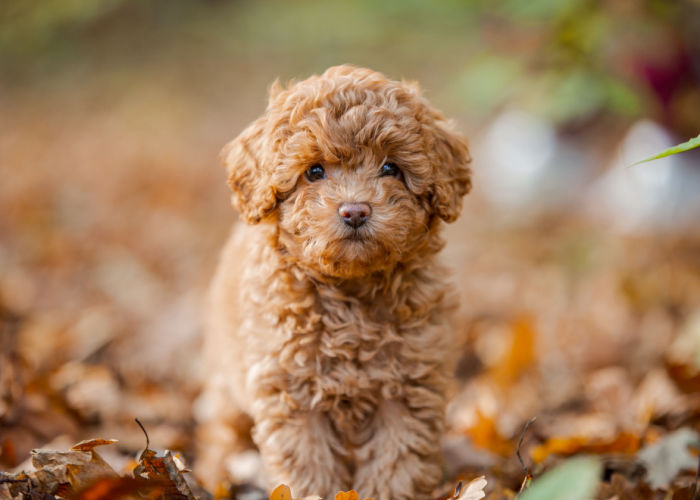
Grooming a Beaglepoo
Low-shedder Poogle is a hypoallergenic mixed-breed dog that requires minimal maintenance. A Poogle may be easier for people with dog allergies to tolerate than other breeds.
Like its Poodle parent, the beagle-poodle cross will likely have curly hair. Therefore, it will require brushing on a regular basis to prevent matts in its hair.
It’s likely that your Poogle dog will only require brushing once per week if it has short hair like its Beagle parent.
In addition, your Beaglepoo needs a bath every 8-12 weeks.
We advise using a mild, all-natural shampoo because the Poodle and the Beagle tend to have sensitive skin.
Other grooming routines are the same for all dogs, including nail trimming and cleaning the eyes and ears.
Additionally, brushing your Poogle's teeth is necessary to avoid periodontal disease.
Even though this would be done daily, doing it every other day is still helpful. Use a finger brush or a tiny toothbrush.
Poogle Health Issues
Although the beagle-poodle mix is mostly a healthy breed, they are susceptible to some health problems like all dogs.
Remember that your Beaglepoo is far more inclined to be healthy if it is bred from two healthy purebred parents than a Poogle puppy that is the result of unintentional breeding.
The following are a few health issues that this dog breed may encounter:
Obesity
Poogles are high-appetite dogs with a propensity for overeating. If they aren't properly cared for, they may get overweight.
PetMD defines overweight dogs as those who weigh at least 10% more than their optimal body weight.
On the other hand, dogs that weigh 20% more than optimal are categorized as obese.
Obesity reduces your dog's lifespan and increases the likelihood of getting sick.
It can increase the chance of developing cancer, type 2 diabetes, heart disease, hypertension, urinary bladder stones, and other conditions.
You may modify your dog's eating routine by
- Creating a feeding plan
- Diets rich in protein and fiber but low in fat
- Replacing traditional treats with carrot sticks
- Incorporate regular visits to your vet for weight-loss advice
- Increasing exercise (e.g., taking more frequent or longer walks or taking up a canine activity that involves running)
Epilepsy
Beagles and Poodles are two of the popular breeds with a greater incidence of epilepsy, according to VCA Animal Hospitals.
You'll see that Fido is behaving a little oddly. Drool might drip out of its mouth and wander about puzzled.
In the same way that the mind seems to “freeze” during a seizure, the body can also become “stuck.”
Your dog might move slowly and appear to be “out of it” or unresponsive to stimulation.
For pet parents, hearing this can be heartbreaking. It's not always possible to pinpoint the cause, though.
Seizures in dogs are classified as idiopathic, or “cause unknown,” when all potential triggers have been ruled out but are still recurring.
Cataracts
Cataracts are opacities in the lens of your dog’s eye.
Blindness results from the retina's inability to receive light when the lens becomes cloudy.
You may notice Fido stumbling over objects, or its eyes might start to look hazy or even bluish.
Unfortunately, no known treatments can stop a cataract from developing. Once they have developed, surgery is the only remedy.
Glaucoma
Poodles are one of the dog breeds that have a genetic susceptibility to glaucoma.
It is painful when the retina and optic nerve are damaged due to increased pressure inside your dog's eye.
Any one or more of the following signs and symptoms could be present in fidos with glaucoma:
- Lethargy
- Vision loss
- Loss of appetite
- Swelling of the eye
- Bulging of the eyeball
- Watery discharge from the eye
- Cloudy, bluish appearance to the eye
- Dilated pupil (or pupil does not respond to light)
Sadly, regardless of surgical therapy, 40% of dogs with glaucoma will go blind in the damaged eye within the first year.
Cherry Eye
Cherry eye is common in Beagles. It happens when the tear gland on the third eyelid starts to expand and develops into a reddish lump.
As a result, improper blood circulation causes an enlargement in the gland itself and a reduction in tear production.
A gland infection is another possibility.
Environmental allergies may occasionally be the root of the cherry eye in dogs.
This is because exposure to allergens may result in an immune system reaction that causes the gland's cell count to rise.
A pink or red mass of tissue near Fido's lower eyelid in its eye is the primary sign of cherry eye. Additional signs comprise:
- Dry eye
- Swollen eyelid
- Pus leaking from the eye
- A mass that goes away and comes back
Hip Dysplasia
Dog hip dysplasia causes the hip joint to become loose, which results in dysfunction and pain.
According to MSD Veterinary Manual, your dog might have a “bunny-hopping” gait.
While the joint is fully extended and bent, there might be a grating sound and pain.
Other therapies may be beneficial for dogs with minor hip dysplasia cases. These consist of exercises, physical treatment, and anti-inflammatory medications.
A number of surgical procedures, such as complete hip replacement, can be used to treat arthritis and alleviate pain.
Cardiac Disease
Several different conditions could result in a heart murmur. Pulmonary stenosis is a condition that can affect some dogs, particularly Beagles.
According to Davies Veterinary Specialists, it is one of the most prevalent congenital heart disorders in dogs.
It's the result of a pulmonic valve abnormality that prevents blood from the heart from reaching the lungs.
The effects of a blockage might range in severity from a murmur to an arrhythmia to congestive heart failure.
Visible indications of pulmonic stenosis, according to PetMD, include:
- Difficulty breathing
- Abdominal distension
- Inability to exercise normally
Addison’s disease
A hormonal disorder called Addison's disease is characterized by your pup's adrenal glands producing fewer hormones than normal.
Cortisol and aldosterone are the two principal hormones produced by the adrenal glands.
Fido's body generally needs cortisol to function well, including controlling its metabolism and blood pressure levels.
On the other hand, aldosterone controls how your dog's organs operate to maintain a potassium and sodium balance.
Without these, your dog’s body starts to fail.
It frequently starts out slowly and manifests itself first with vague signs that appear and go.
Typical signs consist of the following:
- Weight loss
- Being weak and wobbly
- Vomiting from time to time
- Diarrhea from time to time
- Drinking and peeing more than usual
Mitral valve disease
Age-related alterations to the heart's valves lead to the frequent cardiac condition known as mitral valve disease in dogs.
Dogs with MVS should be checked often for signs of deteriorating cardiac disease, such as coughing, shortness of breath, activity intolerance, or fainting.
Over the course of their lifespan, one in ten dogs (10%) may experience some sort of heart disease, with mitral valve insufficiency accounting for 80% of these cases.
The most frequently affected breeds are little dogs like Chihuahuas and Miniature Poodles.
Poogle Exercise & Activities
The Poogle dog has an average amount of physical activity and needs to engage in 30 to 60 minutes of organized daily exercise.
Remember, Poogles are prone to boredom and require a lot of mental stimulation.
Agility and scent trails are examples of outdoor activities.
You may also provide them with interactive toys and food puzzles they can use at home.
It is common for your beagle-poodle mix to develop bothersome habits out of pure irritation when its mind is neglected.
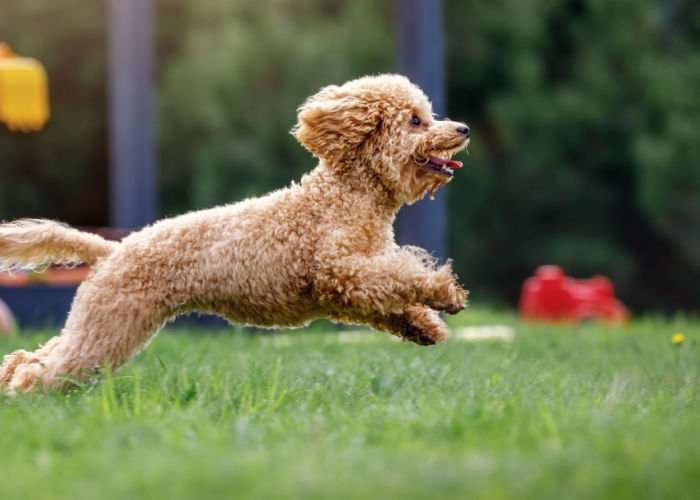
Beaglepoo Trainability
The Beaglepoo is not a particularly difficult breed to teach, but it is also not the easiest. It inherits its high level of intelligence from both of its parents.
But there's a chance it'll get the Beagle breed's stubbornness. However, it could also not.
Therefore, as soon as you bring your beagle-poodle mix home, begin teaching it right immediately to prevent any potential trouble.
To start with, socializing is essential for boosting your furry friend's confidence. Try introducing it to as many new people and animals as possible in a safe setting.
Naturally, start with your family and any other pets you have at home.
In addition, since your dog will probably have separation anxiety, it's a good idea to crate-train it.
Fido will jump right in and feel secure in its new space if you make it enjoyable.
Early guidance and discipline will boost Fido's likelihood of developing into an obedient Poogle puppy later.
Beaglepoo Diet & Feeding
The Poogle needs excellent market dog food that is specially made for small-breed dogs.
Due to the Poodle's several breed sizes, the Poogle can come in a wide range of sizes.
Therefore, it's crucial to ensure that Fido's kibble is the proper size for its mouth.
The Poogle dog will eat two to three meals daily, totaling around one cup of food per meal.
To keep your Poogle's coat looking glossy and gorgeous, you must feed it high-quality kibble that is rich in Omega-3 Fatty Acids.
As mentioned, Beagles have a ravenous appetite that, if unchecked, can result in obesity.
Keep treats to a minimum and watch how much your Beaglepoo is eating to prevent overeating.
Poogle Dog Breed: FAQs
Are Poogles hypoallergenic?
The Poogle is a hypoallergenic dog. In fact, the standard, miniature, and toy varieties of the parent Poodle all have little allergy risk.
Due to their non-shedding, low-dander, wool-like coat, Poodles are a wonderful choice for those with dog allergies.
Are Poogles smart?
The Poogle dog can inherit the intelligence of its Poodle parent.
They are among the most intelligent breeds of dogs, and their desire to please others makes them excellent service companions.
According to Stanley Coren, a canine psychologist, Poodles are the 2nd smartest dog breed when it comes to “obedience and working intelligence.”
What is the lifespan of a Poogle?
Poogles are healthy dogs with a life expectancy between 10 and 13 years.
A healthy diet and regular exercise can help this breed live longer.
Follow proper breeding practices that include regular vet exams to assist your Poogle in avoiding the possibility of congenital illnesses.
Do Poogles bark a lot?
Since Beagles and Poodles can be barkers, most beagle and poodle mixes may share this trait with their parents.
Although not all Poogles bark excessively, some do, and that can be troubling, particularly for people who live in apartment buildings.
Poogle Dog Breed: Final Thoughts
This beagle-poodle mix needs a lot of attention and stimulation to be content.
If you can give your Poogle pup ample opportunities to play outside, it can be a wonderful dog companion.
Make sure your Poogle participates in plenty of socializing and exercise.
When taking them for walks, keep them on a leash in case a curious scent awakens their hunting instincts.
They can be fantastic additions to any household because of their intelligence and affectionate nature.
So, if you’re looking for a buddy to explore the world with, a mighty and lovely Poogle pup is the perfect partner for you!












